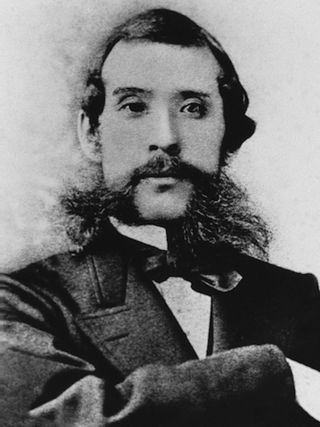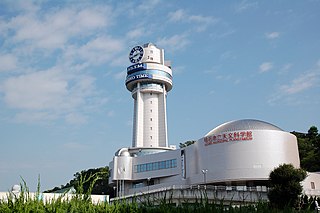Related Research Articles

The Liberal Democratic Party,frequently abbreviated to LDP or Jimintō (自民党),is a major conservative and Japanese nationalist political party in Japan.

Shigeru Yoshida was a Japanese diplomat and politician who served as Prime Minister of Japan from 1946 to 1947 and from 1948 to 1954,serving through most of the American occupation following the Pacific War. He played a significant part in determining the course for post-war Japan by forging a strong relationship with the United States and pursuing economic recovery.

Soka Gakkai is a Japanese Buddhist religious movement based on the teachings of the 13th-century Japanese priest Nichiren. It claims the largest membership among Nichiren Buddhist groups.

Ōkubo Toshimichi was a Japanese statesman and one of the Three Great Nobles regarded as the main founders of modern Japan.

Akashi is a city in southern Hyōgo Prefecture,Japan. As of 1 February 2024,the city had an estimated population of 305,925 in 137,288 households and a population density of 6,200 people per km2. The total area of the city is 49.42 square kilometres (19.08 sq mi).

Iyo is a city located in Ehime Prefecture,Japan. As of 31 March 2022,the city had an estimated population of 35,888 in 16169 households and a population density of 180 persons per km2. The total area of the city is 194.44 square kilometres (75.07 sq mi).
The Ansei Purge was a multi-year event during the Bakumatsu period of Japanese history,between 1858 and 1860,during which the Tokugawa shogunate imprisoned,executed,or exiled those who did not support its authority and foreign trade policies. The purge was undertaken by Ii Naosuke in opposition to Imperial Loyalists.

The Ise Shrine,located in Ise,Mie Prefecture of Japan,is a Shinto shrine dedicated to the solar goddess Amaterasu. Officially known simply as Jingū (神宮),Ise Shrine is a shrine complex composed of many Shinto shrines centered on two main shrines,Naikū (内宮) and Gekū (外宮).

Meoto Iwa (夫婦岩),or Married Couple Rocks,are a kind of rock formation seen as religiously significant in Shinto. They are a subtype of Iwakura rock.

The Adventures of Tom Sawyer is a Japanese anime television series produced by Nippon Animation and directed by Hiroshi Saito,which premiered on January 6,1980,and ended its run on December 28 the same year. It is based on the 1876 novel The Adventures of Tom Sawyer by Mark Twain.

Rikken Minseitō was one of the main political parties in pre-war Empire of Japan. It was commonly known as the Minseitō.

The presidency of Millard Fillmore began on July 9,1850,when Millard Fillmore became President of the United States upon the death of Zachary Taylor,and ended on March 4,1853. Fillmore had been Vice President of the United States for 1 year,4 months when he became the 13th United States president. Fillmore was the second president to succeed to the office without being elected to it,after John Tyler. He was the last Whig president. His presidency ended after losing the Whig nomination at the 1852 Whig National Convention. Fillmore was succeeded by Democrat Franklin Pierce.

Nagato-Futami Station is a railway station located in the Hōhoku area of the city of Shimonoseki,Yamaguchi Prefecture,Japan. It is operated by the West Japan Railway Company.

The Atami-class gunboats were a class of riverine gunboats of the Imperial Japanese Navy. The class consisted of two vessels,Atami (熱海) and Futami (二見). Designed for service on Chinese rivers,they were an improved version of the Seta class. They were constructed by Fujinagata at Osaka,Japan in 1928 to 1930. The gunboats served in the Second Sino-Japanese War and World War II until their surrender in 1945. They were taken over by the Republic of China and renamed Yung Ping and Yung An respectively. Both ships were captured in 1949 by Communist China during the Chinese Civil War.
Paternalistic conservatism is a strand of conservatism which reflects the belief that societies exist and develop organically and that members within them have obligations towards each other. There is particular emphasis on the paternalistic obligation,referencing the feudal concept of noblesse oblige,of those who are privileged and wealthy to the poorer parts of society. Consistent with principles such as duty,hierarchy,and organicism,it can be seen as an outgrowth of traditionalist conservatism. Paternalistic conservatives do not support the individual or the state in principle but are instead prepared to support either or recommend a balance between the two depending on what is most practical.
Tatsuo Murayama was a Japanese politician who was a member of the Liberal Democratic Party (LDP) and finance minister for two times.
Hiroshi Futami is a Japanese football defender who currently plays for FC Imabari in the J3 League.

Elaine Black Yoneda was an American labor and civil rights activist,member of the Communist Party and candidate for political office in California.

The Kaga Rebellion or ChōkyōUprising was a large-scale revolt in Kaga Province,Japan,in late 1487 through 1488. Togashi Masachika,who ruled Kaga Province as shugo,had been restored to power in 1473 with aid from the Asakura clan as well as the Ikkō-ikki,a loose collection of lesser nobility,monks,and farmers. By 1474,however,the Ikkō-ikki grew discontent with Masachika,and launched some initial revolts,which were easily quelled. In 1487,when Masachika left on a military campaign,between 100,000 and 200,000 Ikkō-ikki revolted. Masachika returned with his army,but the Ikkō-ikki,backed by several disaffected vassal families,overwhelmed his army and surrounded him in his palace,where he committed seppuku. The former vassals of Masachika granted the position of shugo to Masachika's uncle Yasutaka,but over the next several decades,the Ikkō-ikki increased their political hold on the province,eventually abolishing the shugo. They effectively controlled Kaga for almost a century.

Lei Jieqiong,also known as Kit King Lei,was a Chinese sociologist,activist,and politician. Educated in the United States,she taught at Yenching University,China University of Political Science and Law,and Peking University in Beijing and Soochow University,St. John's University,University of Shanghai,and Aurora University in Shanghai. She was a cofounder of Zhongzheng University in Jiangxi during the Second Sino-Japanese War.
References
- ↑ "Roster of Members of the Japanese National Diet 1988", University of California , The Japan Times, p. 83, 1988, ISBN 9784789004022
- ↑ Reed, Steven (March 2004). Japanese Electoral Politics: Creating a New Party System. Taylor & Francis. p. 116. ISBN 9781134385959 – via Google Books.
- ↑ "Who's who in Asian and Australasian Politics", University of California , Bowker-Saur, p. 85, 1991